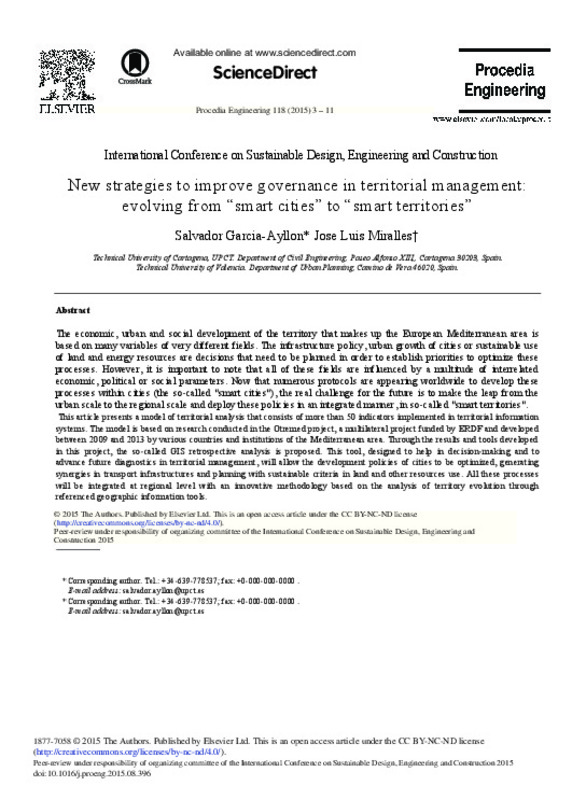JavaScript is disabled for your browser. Some features of this site may not work without it.
Buscar en RiuNet
Listar
Mi cuenta
Estadísticas
Ayuda RiuNet
Admin. UPV
New strategies to improve governance in territorial management: evolving from smart cities to smart territories
Mostrar el registro sencillo del ítem
Ficheros en el ítem
| dc.contributor.author | GARCÍA-AYLLON VEINTIMILLA, SALVADOR
|
es_ES |
| dc.contributor.author | Miralles García, José Luis
|
es_ES |
| dc.date.accessioned | 2015-11-23T13:03:06Z | |
| dc.date.available | 2015-11-23T13:03:06Z | |
| dc.date.issued | 2015 | es_ES |
| dc.identifier.issn | 1877-7058 | es_ES |
| dc.identifier.uri | http://hdl.handle.net/10251/57907 | |
| dc.description.abstract | The economic, urban and social development of the territory that makes up the European Mediterranean area is based on many variables of very different fields. The infrastructure policy, urban growth of cities or sustainable use of land and energy resources are decisions that need to be planned in order to establish priorities to optimize these processes. However, it is important to note that all of these fields are influenced by a multitude of interrelated economic, political or social parameters. Now that numerous protocols are appearing worldwide to develop these processes within cities (the so-called "smart cities"), the real challenge for the future is to make the leap from the urban scale to the regional scale and deploy these policies in an integrated manner, in so-called "smart territories". This article presents a model of territorial analysis that consists of more than 50 indicators implemented in territorial information systems. The model is based on research conducted in the Otremed project, a multilateral project funded by ERDF and developed between 2009 and 2013 by various countries and institutions of the Mediterranean area. Through the results and tools developed in this project, the so-called GIS retrospective analysis is proposed. This tool, designed to help in decision-making and to advance future diagnostics in territorial management, will allow the development policies of cities to be optimized, generating synergies in transport infrastructures and planning with sustainable criteria in land and other resources use. All these processes will be integrated at regional level with an innovative methodology based on the analysis of territory evolution through referenced geographic information tools. | es_ES |
| dc.language | Inglés | es_ES |
| dc.publisher | Elsevier | es_ES |
| dc.relation.ispartof | Procedia Engineering | es_ES |
| dc.rights | Reconocimiento - No comercial - Sin obra derivada (by-nc-nd) | es_ES |
| dc.subject | Territorial management | es_ES |
| dc.subject | Smart cities | es_ES |
| dc.subject | GIS retrospective analysis | es_ES |
| dc.subject | Smart territories | es_ES |
| dc.subject.classification | URBANISTICA Y ORDENACION DEL TERRITORIO | es_ES |
| dc.title | New strategies to improve governance in territorial management: evolving from smart cities to smart territories | |
| dc.type | Artículo | es_ES |
| dc.identifier.doi | 10.1016/j.proeng.2015.08.396 | es_ES |
| dc.rights.accessRights | Abierto | |
| dc.contributor.affiliation | Universitat Politècnica de València. Departamento de Urbanismo - Departament d'Urbanisme | es_ES |
| dc.description.bibliographicCitation | García-Ayllon Veintimilla, S.; Miralles García, JL. (2015). New strategies to improve governance in territorial management: evolving from smart cities to smart territories . Procedia Engineering. 118:3-11. doi:10.1016/j.proeng.2015.08.396 | es_ES |
| dc.description.accrualMethod | S | es_ES |
| dc.relation.publisherversion | http://dx.doi.org/10.1016/j.proeng.2015.08.396 | |
| dc.description.upvformatpinicio | 3 | es_ES |
| dc.description.upvformatpfin | 11 | es_ES |
| dc.type.version | info:eu-repo/semantics/publishedVersion | es_ES |
| dc.description.volume | 118 | es_ES |
| dc.relation.senia | 293573 | es_ES |








